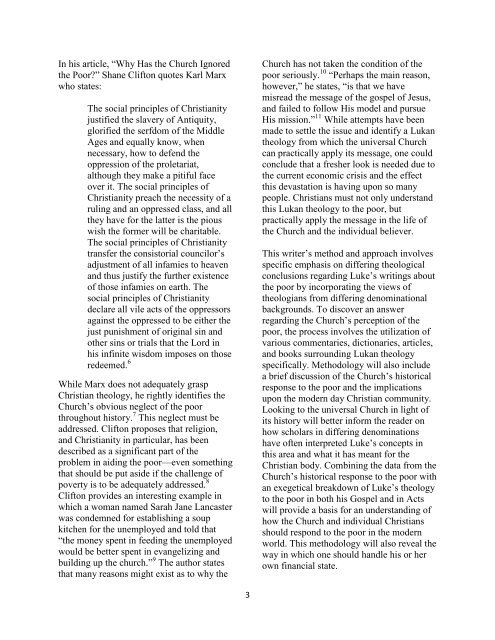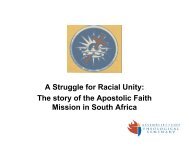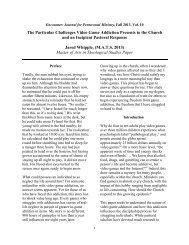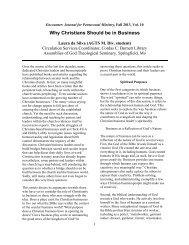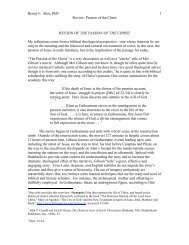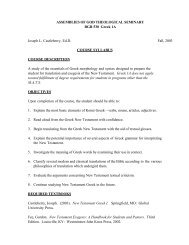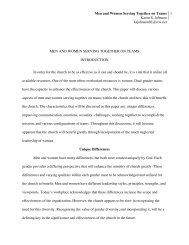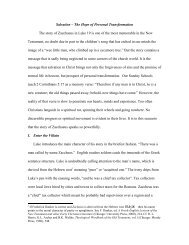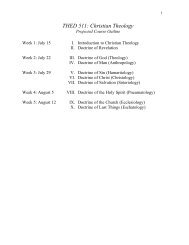Encounter: Journal for Pentecostal Ministry - Assemblies of God ...
Encounter: Journal for Pentecostal Ministry - Assemblies of God ...
Encounter: Journal for Pentecostal Ministry - Assemblies of God ...
Create successful ePaper yourself
Turn your PDF publications into a flip-book with our unique Google optimized e-Paper software.
In his article, “Why Has the Church Ignored<br />
the Poor?” Shane Clifton quotes Karl Marx<br />
who states:<br />
The social principles <strong>of</strong> Christianity<br />
justified the slavery <strong>of</strong> Antiquity,<br />
glorified the serfdom <strong>of</strong> the Middle<br />
Ages and equally know, when<br />
necessary, how to defend the<br />
oppression <strong>of</strong> the proletariat,<br />
although they make a pitiful face<br />
over it. The social principles <strong>of</strong><br />
Christianity preach the necessity <strong>of</strong> a<br />
ruling and an oppressed class, and all<br />
they have <strong>for</strong> the latter is the pious<br />
wish the <strong>for</strong>mer will be charitable.<br />
The social principles <strong>of</strong> Christianity<br />
transfer the consistorial councilor‟s<br />
adjustment <strong>of</strong> all infamies to heaven<br />
and thus justify the further existence<br />
<strong>of</strong> those infamies on earth. The<br />
social principles <strong>of</strong> Christianity<br />
declare all vile acts <strong>of</strong> the oppressors<br />
against the oppressed to be either the<br />
just punishment <strong>of</strong> original sin and<br />
other sins or trials that the Lord in<br />
his infinite wisdom imposes on those<br />
redeemed. 6<br />
While Marx does not adequately grasp<br />
Christian theology, he rightly identifies the<br />
Church‟s obvious neglect <strong>of</strong> the poor<br />
throughout history. 7 This neglect must be<br />
addressed. Clifton proposes that religion,<br />
and Christianity in particular, has been<br />
described as a significant part <strong>of</strong> the<br />
problem in aiding the poor—even something<br />
that should be put aside if the challenge <strong>of</strong><br />
poverty is to be adequately addressed. 8<br />
Clifton provides an interesting example in<br />
which a woman named Sarah Jane Lancaster<br />
was condemned <strong>for</strong> establishing a soup<br />
kitchen <strong>for</strong> the unemployed and told that<br />
“the money spent in feeding the unemployed<br />
would be better spent in evangelizing and<br />
building up the church.” 9 The author states<br />
that many reasons might exist as to why the<br />
3<br />
Church has not taken the condition <strong>of</strong> the<br />
poor seriously. 10 “Perhaps the main reason,<br />
however,” he states, “is that we have<br />
misread the message <strong>of</strong> the gospel <strong>of</strong> Jesus,<br />
and failed to follow His model and pursue<br />
His mission.” 11 While attempts have been<br />
made to settle the issue and identify a Lukan<br />
theology from which the universal Church<br />
can practically apply its message, one could<br />
conclude that a fresher look is needed due to<br />
the current economic crisis and the effect<br />
this devastation is having upon so many<br />
people. Christians must not only understand<br />
this Lukan theology to the poor, but<br />
practically apply the message in the life <strong>of</strong><br />
the Church and the individual believer.<br />
This writer‟s method and approach involves<br />
specific emphasis on differing theological<br />
conclusions regarding Luke‟s writings about<br />
the poor by incorporating the views <strong>of</strong><br />
theologians from differing denominational<br />
backgrounds. To discover an answer<br />
regarding the Church‟s perception <strong>of</strong> the<br />
poor, the process involves the utilization <strong>of</strong><br />
various commentaries, dictionaries, articles,<br />
and books surrounding Lukan theology<br />
specifically. Methodology will also include<br />
a brief discussion <strong>of</strong> the Church‟s historical<br />
response to the poor and the implications<br />
upon the modern day Christian community.<br />
Looking to the universal Church in light <strong>of</strong><br />
its history will better in<strong>for</strong>m the reader on<br />
how scholars in differing denominations<br />
have <strong>of</strong>ten interpreted Luke‟s concepts in<br />
this area and what it has meant <strong>for</strong> the<br />
Christian body. Combining the data from the<br />
Church‟s historical response to the poor with<br />
an exegetical breakdown <strong>of</strong> Luke‟s theology<br />
to the poor in both his Gospel and in Acts<br />
will provide a basis <strong>for</strong> an understanding <strong>of</strong><br />
how the Church and individual Christians<br />
should respond to the poor in the modern<br />
world. This methodology will also reveal the<br />
way in which one should handle his or her<br />
own financial state.


